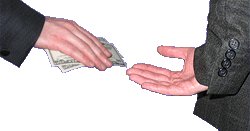To the benefit of the EU itself, Commissioner for Home Affairs Cecilia Malmstrom announced a new European mechanism to tackle corruption on May 7th. This non-binding mechanism is set to include a report to be released every two years addressing the worst corruption cases in the 27 Member states, pointing at the causes and explaining the most effective practices put into force. “Most of the Member states have already implemented effective and modern legal frameworks to fight corruption – said Commissioner Malmstrom – but these laws have to be completely implemented yet”. She hopes that “naming and blaming” will serve to help Member states to get rid of such practices.
Corruption is estimated to amount to around 120 billion Euros per year, like the general EU budget. This means that nonetheless many efforts to solve the problem national legislations have up to now fallen flat. In the long run such a widespread corruption is bound to undermine European integration and citizens’ trust in the EU. After more than 10 years since the anti corruption convention of the Council of Europe has been adopted, it is time to take stock of the results which, unfortunately, are worse than expected. Romania and Bulgaria in the East still lack standard requirements to get into Schengen area, at least according to French and German authorities. Others cast a shadow of doubt even on Italy and Spain, which undergo a rise in organized crime. Northern States insist on Brussels intervening in order to prevent this phenomenon from spreading throughout Europe.
In the light of such a situation, the report to be launched in 2013 might help enhancing the fight against corruption in the East and in the South as well as boosting the EU reputation. In such a way, Europe could become cleaner and Schengen area would be seen more as an asset than a burden. Of course Member states are required to make a better use of their legislations implementing them in a clear-cut way. Commissioner Malmstrom will have to convince other Commissioners, who might be not so willing to blame their own countries, to sign for a ’zero tolerance’ in reporting such abuses. Some could conjure up the image of Commission Santer, back fallen after a huge corruption scandal in 1999 involving some members of the college. But the aim is worth a try.
The row upon Romania and Bulgaria accession in Schengen is making clear how high the diversions within the EU can be. Extremist parties are trying to throw the borderless area into doubts. Nationalist movements in the limelight are urging Brussels progressively to shut down European borders. People, affected by the economic crisis and unemployment, are becoming more sensitive to such claims. As the time being, Romania and Bulgaria’s bids have been left strained by French and German halting, which recently receive Finnish, Dutch and Danish solidarity.
Of course the recent scandal in the European Parliament involving some MEPs, whom accepted bribes from false lobbyists, does not help at all. If an example is to be given, the EU institutions cannot allow themselves to stand for it right now. Therefore Malmstrom is right when she says it is time to bring such looming practices to an end. The sooner the better.


Follow the comments: |
|
